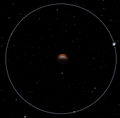Duna/zh-cn
Duna是Kerbol 星系中的第四颗行星。它实际上是火星在 Kerbal 太空计划中的化身,除了两极覆盖的极冠外都呈红色。它拥有一颗天然卫星,Ike 卫星。由于 Ike 的体积和它的近距离轨道,Ike 绕 Duna 同步自转。
如果利用合适的气动减速手段,从 Kerbin 到 Duna 轨道的往返航程需要大约 1700 m/s 的 delta-v,比去其他行星的旅程都要小。由于其低轨道倾角,登陆 Duna 无疑是相对最容易的。
Contents
地形
Duna 地表的海拔高度变化范围是 23 m ~ 4740 m 。它多山的地形无疑是飞行器着陆所面临的一大困难,尤其是考虑到它稀薄的大气层,气动刹车的效果不会太好。Duna 的极冠范围很大,这也是稀薄的大气层所造成的结果。
Duna 上有几处陨石坑,但似乎被侵蚀的很厉害,很可能是风的作用。还有一个区域遍布着深洞(有些深度超过 1 km),这些似乎不太可能是陨石造成的(或许是所谓的天坑?)。
还有一些月海区域(大片的深色土壤)位于海拔 0 米的区域.这里地面平坦,海拔低,气动刹车距离较长,因此适合降落着陆,但缺点是这里的环境过于单调。
Duna 上还分布着一些神秘的地点。
大气
Duna 的大气始于 41,446 m 高度。在 0 海拔点大概只有 Kerbin空气密度的 20 %,甚至比 Kerbin 的高海拔(相对于 Kerbin)地点还要低。这一效应在 Duna 的高海拔点尤为明显,在这儿气压大约只有零海拔点的 21 %。(相比而言,在 Kerbin,海拔最高点的山峰气压还可以达到海平面的 45 %。)这种低气压也导致了降落伞的半张点大幅度降低,Mk25 型降落伞大约是在 10 km,而其他降落伞都低于 9km。
着陆
在 Duna 着陆时,气动刹车可以显著的降低轨道速度和着陆速度,从而节约燃料。为了达到最佳的效果,气动刹车机动应采取低进入角,着陆点选择在低海拔低点,来尽量延长大气层中的停留时间。
和游戏中的大气一样,Duna 的大气压力都会随高度的增加而急剧的降低(以高度的三千分之一为指数)。大体而言,Duna 气压与高度的关系可以用下列公式表述: [1]
降落伞在这里的效率比 Kebin 要低,因此机动下降通常是必需的(除非你能增加阻力/降落伞)。
飞行
Duna 的大气或许比较稀薄,但是 5 km 以下的大气层还是可以帮助机翼产生足够的升力,因此气动飞行在这个区域是可行的。由于缺乏氧气,喷气发动机无法工作,但可以采用其他推进方式。利用飞机去进行水平降落也是可行的。
起飞
从地面起飞进入 Duna 低轨道大约需要 1500 至 2000 m/s 的 Delta-V,轨道高度 42 km ,速度大约是 950 m/s 。
下表列出了不同高度轨道所需要的速度。同时也是以游戏中的空气阻力模型为基础,从 Duna 起飞到某高度最优燃料消耗所需要的速度。[2]
| 高度 (m) | 速度 (m/s) |
|---|---|
| 0 | 212 |
| 1000 | 231 |
| 2000 | 252 |
| 3000 | 274 |
| 5000 | 324 |
| 8000 | 418 |
| 10000 | 495 |
| 13000 | 638 |
| 15000 | 756 |
| 20000 | 1.16×103 |
跟踪站提供的信息
长久以来,Duna 对于 Kerbal 世界都是一个奇观,Kerbal 人早就知道这个努力眯缝着眼就可以看到的小红点了。 由于它吓人的红色外观,以及它与绿色的强烈对比,Kerbal 小绿人们对于这颗行星充满了敬畏。
运行轨道数据
Duna 的 同步轨道高度为 0.00 米。卫星速度为 0.00 米/秒,轨道周期 1 Duna 日(18.2 小时或 65517.859375 秒)。然而,它与 Ike 轨道高度相同,除非该飞行器的轨道十分精确,否则最终都会被 Ike 的引力捕获。
周期 ½ Duna 日(9.1 小时或 32758.9295 秒)的半同步轨道轨道高度 0.00 米 ,轨道速度 0.00 米/秒。
Observation of Ike
Ike's orbit keeps it directly above a short range of Duna longitudes. The average Duna longitude where Ike tends to stay directly above in the sky (at the Zenith) is 6 degrees east, but the exact longitude oscillates between about 2 degrees and 10 degrees east due to the eccentricity of Ike's orbit. This eccentricity also makes Ike appear to grow slightly larger and smaller to an observer on the surface of Duna. The latitude for which Ike is in the Zenith also oscillates between 0.2 degrees south and 0.2 degrees north due to Ike's orbital inclination, making Ike appear to rotate upwards and downwards as viewed from the surface, but due to the extremely small orbital inclination, this effect is nearly imperceptible. These phenomena together are known as libration. Due to the oscillation in Ike's position above the horizon, areas from 88°W to 80°W and 92°E to 100°E on Duna can observe Ike rise and set at least partially across the horizon, as can any areas north of 89.8°N or south of 89.8°S.
星际飞行
从 Duna 轨道出发,到达其他天体的轨道所需要的 delta-V 如下:
| 天体 | Delta-V | |
|---|---|---|
| Ike | ~300 m/s | |
| Kerbin | ~620 m/s | |
| Dres | ~820 m/s | |
| Eve | ~1080 m/s | |
| Jool | ~1350 m/s | |
| Eeloo | ~1580 m/s | |
| Moho | ~2100 m/s | |
时间加速
| 时间加速 | 最低海拔 |
|---|---|
| 1× | 所有 |
| 5× | 50 000 米 (高于大气上限) |
| 10× | 50 000 米 (高于大气上限) |
| 50× | 60 000 米 |
| 100× | 100 000 米 |
| 1 000× | 300 000 米 |
| 10 000× | 600 000 米 |
| 100 000× | 800 000 米 |
Gallery
- Duna projection.png
A false color Mercator projection of Duna's surface using MapSat.
Duna at sunrise
Changes
- Minor art pass
- Initial Release
Trivia
- Duna's name may be either a reference to its desert landscape or a shout-out to the Frank Herbert novel Dune.
- The low-lying areas near Duna's equator make a shape resembling Europe.
- On the surface of Duna, there is a large monument carved in the likeness of a Kerbal face, alluding to the infamous "Face of Mars" discovered in the Cydonia Mensae region of Mars during the 1970's.
- Buried deep under the surface, there is a small camera, similar to the design on the Pathfinder rover.
- One anomalous feature on Duna is a small, pyramid-like hill emitting an SSTV signal. When decrypted, it shows a diagram-like image of three figures standing next to the hill itself, implying that Duna was once inhabited or visited before.
Notes
- ↑ A nuclear engine has a specific impulse of 220 in 1 atm, 800 in vacuum, and the following at various Duna altitudes:
altitude (m) 2 100 300 500 1460 2420 3000 4272 5000 10000 specific impulse 684.1 687.8 695.1 701.8 728.7 748.2 757.3 772.1 778.1 795.9 - ↑ http://forum.kerbalspaceprogram.com/showthread.php/6664-Mini-challenge-max-altitude-with-this-supplied-spacecraft?p=100912&viewfull=1#post100912










